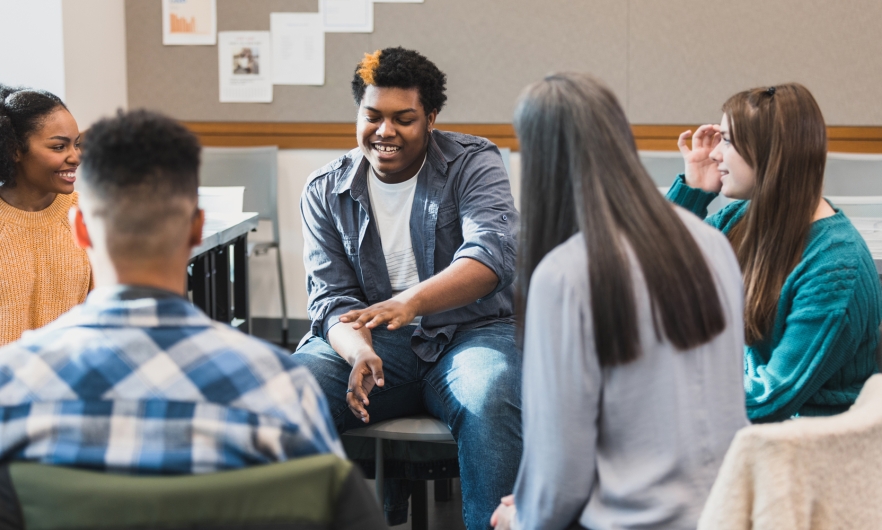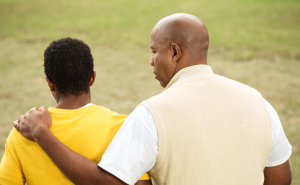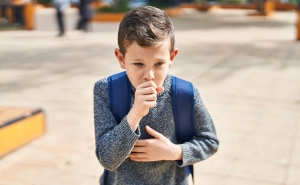RAP Club: Promoting Adolescent Mental Health in Schools
A program developed by Bloomberg School researchers teaches teens mindfulness and coping strategies.

Pandemic disruptions took a toll on adolescent mental health in the U.S., but even before school closures and lockdowns began, teens were already suffering. Rates of anxiety and depression among U.S. teens have increased faster than rates for older age groups over the past 10 years.
Treatments for mental health disorders, such as cognitive behavioral therapy and pharmacotherapy, are well established, yet 60% of young Americans experiencing depression receive no treatment at all due to a number of factors–financial, cultural, and geographical barriers among them.
One way to address the problem: Bring mental health training to schools.
A Stigma-Free, School-Based Intervention
In an effort to meet teens where they are, researchers like Tamar Mendelson, PhD, are turning to schools as intervention sites. Mendelson, director of the Center for Adolescent Health, recently led a study of a program that aims to tackle the teen mental health crisis by bolstering students’ awareness and resilience.
RAP (Relax, be Aware, and do a Personal rating) Club teaches students mindfulness and cognitive behavioral skills with the goal of preventing mental illnesses before they take root. The program was initially adapted with input from teens through a partnership between the Center for Adolescent Health and the Baltimore Youth Opportunity Centers, which connects young people to job training and GED prep.
“The YO Centers had identified mental health as a key concern that was preventing young people from completing their programs,” Mendelson says. “We worked with young people at YO over many months to select and adapt an intervention to promote mental health.”
Together, they chose to adapt a successful treatment program called Structured Psychotherapy for Adolescents Responding to Chronic Stress, or SPARCS, which provides group therapy for teens exposed to trauma. But unlike SPARCS, RAP Club emphasizes prevention rather than treatment, takes place in the community instead of a clinical setting, and empowers peer leaders to help trained adults lead sessions.
Encouraging findings of reduced depressive symptoms and improved coping led Mendelson’s team to further adapt the program for middle schools to reach young people at earlier ages and promote their positive transition into high school.
In 2014, Mendelson and her team conducted a pilot randomized study among 49 7th and 8th graders in two Baltimore City public schools. For six weeks, RAP Club groups met twice weekly, beginning with the guided meditation for which the group is named:
- Relax: Students are encouraged to relax their bodies and minds and to breathe.
- Be Aware: Students are asked to notice their surroundings and sensations.
- Do a Personal Rating: On a “thermometer” ranging from 1–10, students rate themselves on how distressed they feel and how capable they feel of handling their distress.
RAP Club is integrated into the school day to remove any stigma that might accompany pulling students out of class for a specialized service. So far, the program has been delivered during periods when elective courses are offered. Instead of going to music or art class, students can go to a class that teaches emotional and social skills.
The program’s activities are designed to be engaging and fun while illustrating core features of mindfulness directly, rather than through lectures. In one activity, students practice suspending judgment and being present in the moment by throwing a ball to each other, with whoever catches it making a silly noise. Other activities equip students with the vocabulary to name their feelings, an important step in learning how to regulate one’s emotions. Each class begins and ends with students taking their “emotional temperature” with a RAP Club thermometer. In another activity, students don rain ponchos before shaking a bottle of soda and opening it—a fizzy illustration of the effects of bottling up one’s emotions.
Promising Outcomes
Teachers reported “robust” improvements in RAP Club students’ emotional regulation, social competence, authority acceptance, and academic competence. Even students who started the program with low levels of depression improved significantly, suggesting universal mindfulness training has the benefit of helping all students, not just ones who appear to be struggling.
Mendelson and her team received funding to do a larger study on RAP Club from the National Institute of Child Health and Human Development and the Institute of Education Sciences. Over a span of four years, 29 Baltimore City public schools participated in the Project POWER (PrOmoting Wellness and Emotion Regulation) trial, in which some students were randomly assigned to RAP Club while others attended Healthy Topics, a basic health education course, as a control.
Project POWER delivered promising results. A follow-up with participants four months after participating in RAP Clubs showed significant improvements in PTSD symptoms, while a 12-month follow-up revealed significant improvements in depressive, anxiety, and PTSD symptoms, as well as behavior problems. Students found the program helpful, citing noticeable results. One student said, “I feel like RAP changed my depression. Depression went away from me.” Another student concluded he had “been dealing with stress way better. Way, way better.”
A follow-up with a subset of participants after the lockdown phase of the COVID pandemic delivered even more positive news. Students who had participated in RAP Club were significantly less likely to experience anxiety and appeared to experience less depression than peers who took basic health education classes.
Building on RAP Club’s Success
The next step for Project POWER is turning research into practice, which means figuring out how to implement the program broadly and over the long term. “The next step in this work is to test a more sustainable delivery model—training and coaching school personnel to deliver RAP Club—which will make large-scale dissemination possible,” says Mendelson.
Mendelson is developing a proposal to test outcomes when RAP Club is delivered by school personnel, rather than by study team members. In preparation, another pilot study is underway to train school personnel to deliver RAP Club in three more Baltimore City schools.
“Too many evidence-based programs sit on the shelf and are not used in the real-world settings they were designed for,” Mendelson says. “Ultimately, I would love to see this program incorporated into middle school programming on a broad scale.”
Aleyna Rentz is a marketing specialist for the Johns Hopkins Bloomberg School of Public Health.
RELATED:
- Study Reveals Fourfold Range in Rates of Mental Health Problems Among U.S. Children Based on Relational and Social Risks
- Window of Opportunity: Addressing Teen Suicide Starts in Childhood
- Pilot Study Finds School-Based Prevention Program Shows Promise Educating Young Adolescents About Avoiding Child Sexual Abuse Behaviors





